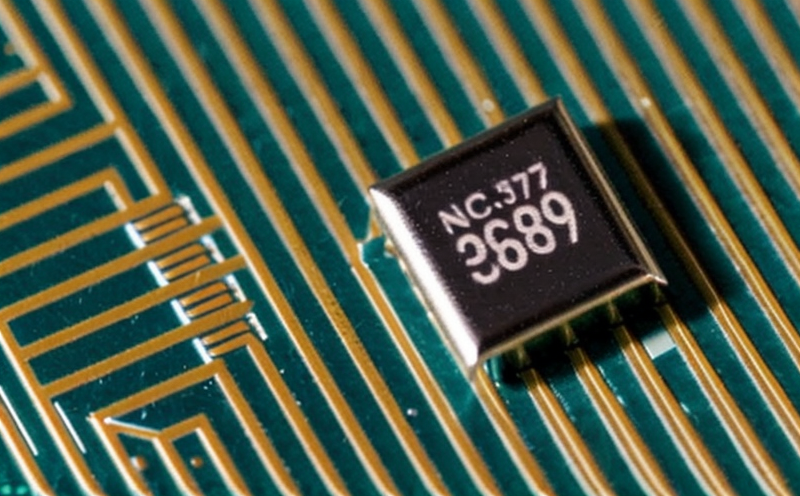ASTM F736 Planarity Measurement Reliability Testing
The ASTM F736 standard is pivotal in ensuring that semiconductor and microchip surfaces are manufactured with consistent flatness, which directly impacts the reliability and performance of electronic devices. The planarity measurement involves assessing the surface flatness of microchips to ensure that they meet stringent manufacturing tolerances set by industry standards.
Planarity is a critical metric because it affects how components interact within circuit boards, influencing signal integrity and overall device stability. Poor planarity can lead to increased electrical resistance, higher power consumption, and even failure during high-frequency operations. This testing ensures that microchips are manufactured with precision, which is essential for the production of reliable electronic devices.
The ASTM F736 standard specifies a method for measuring planarity using stylus profilometry or laser interferometry techniques. These methods allow for accurate measurement of surface irregularities on a microscopic scale, ensuring that even minute deviations from flatness are captured and evaluated. The testing process involves preparing the microchip by cleaning it to remove any contaminants that could interfere with the measurement.
The instrumentation used in this testing typically includes a profilometer or laser interferometer capable of measuring surface roughness down to nanometers. The specimen preparation is crucial, as even slight contamination can lead to inaccurate measurements. Once cleaned and prepared, the microchip is placed on a precision stage within the instrument, where it is scanned to capture its topographical data.
The testing process results in a detailed report that includes surface roughness values and graphical representations of the measured areas. These reports are essential for quality assurance teams to monitor manufacturing processes and ensure compliance with industry standards. Compliance with ASTM F736 not only ensures product reliability but also enhances brand reputation by guaranteeing high-quality products.
For R&D engineers, this testing provides insights into potential improvements in manufacturing techniques that can lead to better planarity outcomes. Procurement teams benefit from knowing that the components they source meet these stringent standards, ensuring that their designs are reliable and performant.
Why It Matters
ASTM F736 testing is crucial for maintaining high standards of reliability in semiconductor manufacturing. By adhering to this standard, manufacturers ensure that the microchips they produce meet precise flatness requirements, which are essential for their performance and longevity.
The importance of planarity cannot be overstated. Even small deviations from a perfectly flat surface can lead to significant issues such as increased electrical resistance, higher power consumption, and potential failure in high-frequency applications. Ensuring that microchips meet the stringent requirements set by ASTM F736 not only enhances the reliability of devices but also contributes to the overall quality and performance.
From a broader perspective, compliance with this standard helps maintain industry benchmarks for product quality. It ensures that manufacturers are producing components that can be relied upon in critical applications, thereby enhancing trust between suppliers and customers.
Industry Applications
| Application | Description |
|---|---|
| Critical Electronics Manufacturing | Involves the production of microchips for high-reliability applications such as automotive electronics, aerospace components, and medical devices. |
| Data Center Infrastructure | Ensures that processors used in data centers meet strict flatness requirements to enhance performance and reliability. |
| Hazardous Environment Electronics | Used for testing microchips destined for use in environments where high reliability is paramount, such as oil rigs or nuclear facilities. |
| Aerospace & Defense | Guarantees that the electronic components used in aircraft and military equipment meet stringent flatness specifications to ensure mission-critical performance. |
- Critical Electronics Manufacturing
- Data Center Infrastructure
- Hazardous Environment Electronics
- Aerospace & Defense
Eurolab Advantages
At Eurolab, we provide ASTM F736 planarity measurement reliability testing with a commitment to precision and accuracy. Our state-of-the-art facilities are equipped with the latest instrumentation capable of measuring surface roughness down to nanometers, ensuring that even the most minute deviations from flatness are captured.
Our experienced team of engineers is well-versed in ASTM F736 standards, allowing us to provide testing services that meet or exceed industry expectations. We offer comprehensive reports detailing the test results and graphical representations of the measured areas, providing clear insights into the planarity of the microchips tested.
The reliability of our testing processes is further enhanced by our stringent quality control measures. We ensure that all specimens are prepared according to ASTM F736 specifications, reducing the risk of errors in the testing process. Our commitment to excellence and adherence to international standards ensures that we deliver accurate and reliable results every time.
Additionally, Eurolab offers a range of supplementary services that complement our ASTM F736 planarity measurement reliability testing. These include advanced surface analysis techniques and failure analysis, providing comprehensive insights into the performance and reliability of your microchips.





